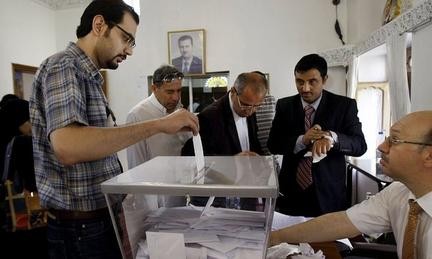(VOVworld) – Syrian voters elected a President on June 3 for the first time in more than 50 years. Although the final vote count has not been announced, incumbent President Bashar Al-Assad is predicted to win and continue in this post for another 7-year term. But restoring security and stability, and national reconstruction and handling the prolonged civil war are not easy tasks.
 |
| Syrian people elected a President for the first time in more than 50 years |
The three presidential candidates were incumbent President Bashar Al-Assad, former Minister of Administrative Development Hassan Al-Nouri, and lawmaker Maher Hajjar.
Favorable developments
The Syrian Parliament requires that a presidential candidate must have been living in Syria for the past 10 years and does not hold a second nationality. The regulations aim to prevent oppositionists living in exile from running, 90% of the Syrian population lives in areas controlled by the Syrian army, which will safeguard the election process. Forces loyal to President Al-Assad have recently taken control of many cities and localities seized earlier by insurgents.
Other developments in the region have given momentum to the government of President Al-Assad: the initial results of Iranian nuclear talks and a victory by the Shiite Muslim coalition in Iraq’s national elections.
Challenges to national reconstruction
So President Bashar Al-Assad enjoys some obvious advantages. But analysts say maintaining these advantages over the long run is another thing. Three years after violence first flared up, Syria is bogged down in a civil war which has devastated the economy and Syrian society. 160,000 people have been killed. 9 million people have become refugees and many have migrated to neighboring countries. 40% of the infrastructure and houses have been damaged. The economy has nosedived. Economic reconstruction will cost an estimated 165 billion USD, equivalent to Syria’s budget for 18 years, excluding unexpected expenditures. It will be difficult for the Al-Assad government to stabilize the situation without external support.
Recently, the number of armed groups in Syria has increased. Syria’s armed opposition forces, mainly Muslim jihadists and terrorists linked to the international Al-Qaeda terrorist network, have expanded into more dangerous activities.
Although the army now has control of most areas, the government has been unable to gain decisive popular support There is no sign yet that opposition groups will lay down their arms any time soon.